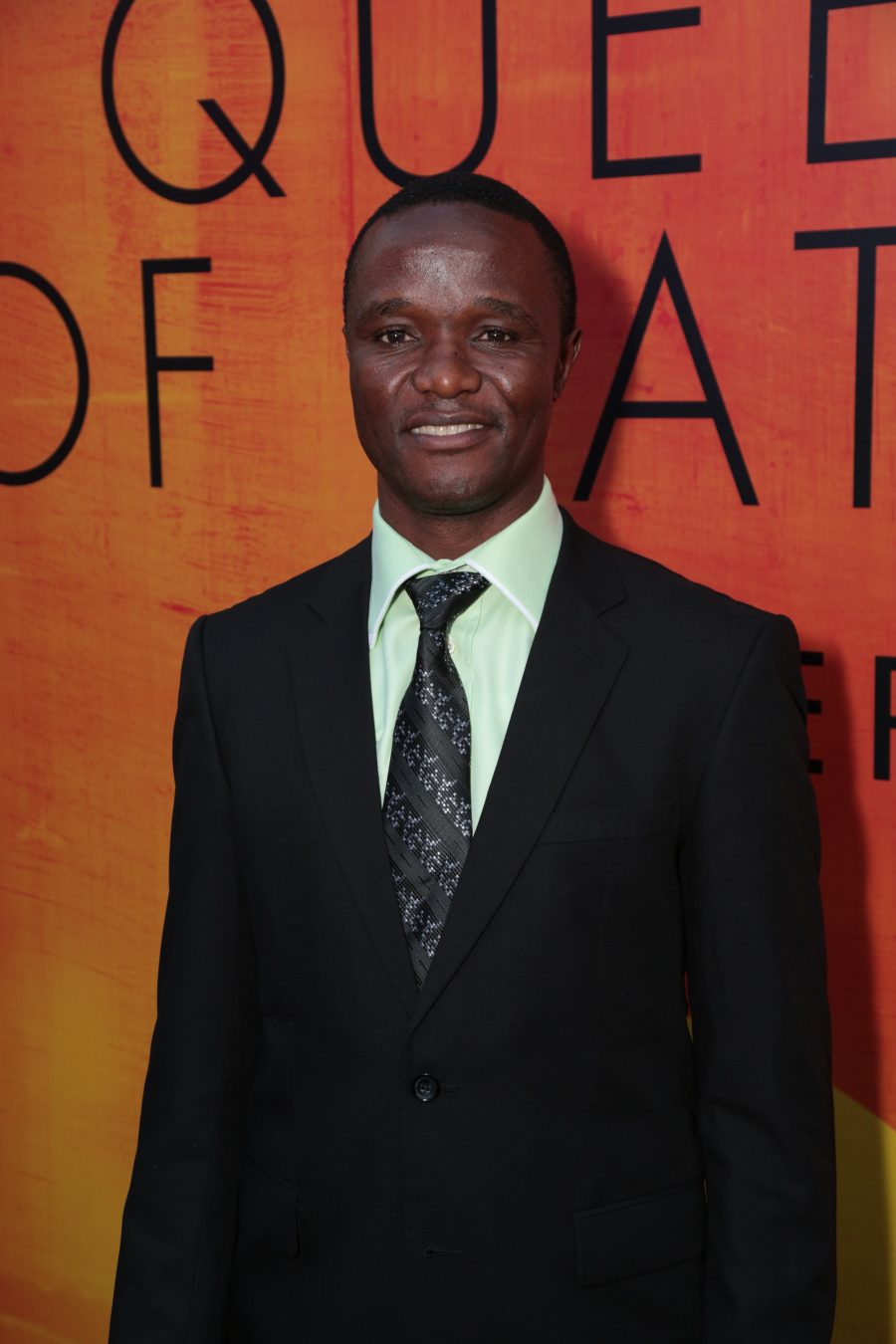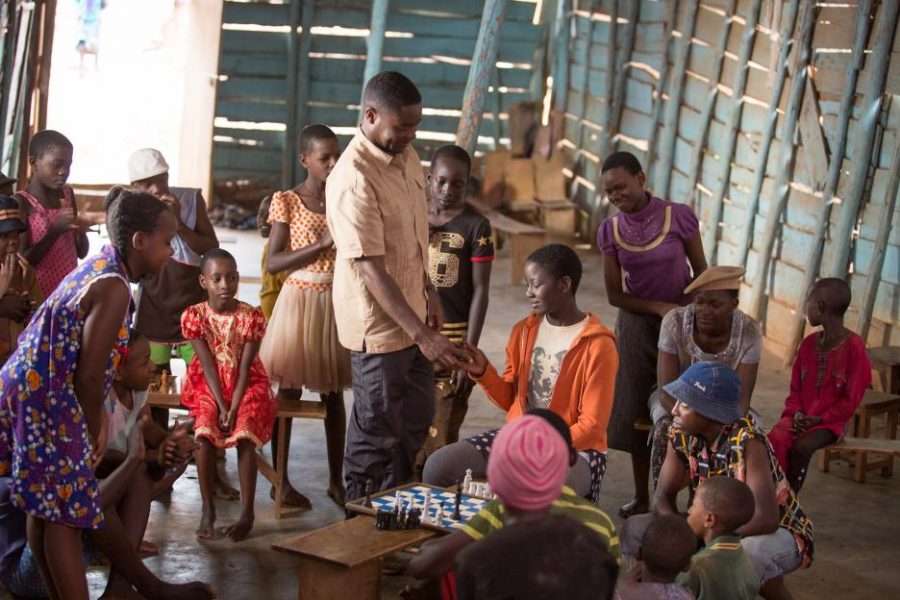I was invited to Los Angeles to attend a press day and the red carpet premiere of Disney’s Queen of Katwe (see my experience HERE, my movie review HERE, my intimate, emotional interview with Lupita Nyong’o, Madina Nalwanga, and Martin Kabanaza HERE, and my interview with Producer Mira Nair HERE).
Travel and accommodations were covered by Disney, but all thoughts are my own. Movie photos courtesy of Disney. Interview photos courtesy of Carol Jones / All Mommy Wants. Amazon affiliate links are included within this post.
I am so thrilled that Queen of Katwe is finally in theaters for everyone to see, because I think it is a movie that everyone SHOULD see. Even though I’ve already seen it twice, I am gladly taking my whole family to see it this afternoon…and I can’t wait!
Seeing Queen of Katwe for the first time was an emotional and moving experience, but seeing it the second time, after meeting the people involved in the movie – and especially the real Phiona Mutesi and Robert Katende, about whose story the movie is based – was profound. I hope that I can convey at least some of the emotion that I felt while listen to Phiona and Robert here.
One of the most moving statements of the interview came from Phiona when she was asked what it was like to see her story on the big screen. Her response? “I liked it when I saw it. I couldn’t think that I was watching myself. But it was my first time in the big theater. I’ve never been in such a situation. I feel like I shouldn’t be there. Like, shouldn’t it be someone else?”
We assured her that she was exactly where she was meant to be. Her story is one that needed to be told. Her story is one that needs to be seen and felt.

Phiona Mutesi at the U.S. premiere of Disney’s Queen of Katwe at the El Capitan Theatre in Hollywood, CA on Tuesday, September 20, 2016. (Photo: Alex J. Berliner/ABImages)
What life lessons can be learned from chess?
I don’t know much about chess. In fact, despite my son’s skill at playing the game, I’ve never quite “got it.” So don’t think that you need to know or appreciate chess to appreciate Queen of Katwe. This movie uses chess as a vehicle to convey many important life lessons.
Robert Katende said, “There are several, actually. You can tackle abstractive thinking, problem solving, decision making, weighing options, and even responsibility because chess kind of mentors you in finding value and where you have to get comfortable with your decisions, and don’t simply make moves.”
“You should have a plan, you should have an objective, an activity objective. It gives you an opportunity to have ideas and try to figure out how to bring them to reality. So you must get input in the integration of these values and principles from the game into your lifestyle.”
The Value of a Mentor
My husband likes to say “be the person you needed when you were their age.” Mentors can have powerful, lasting influences on children, and Coach Katende has certainly been an inspiring mentor for many children in Katwe.
Robert Katende said that being a mentor has helped him learn how to be a better father. Being a mentor to the chess children taught him about tolerance, patience, and embracing each person’s abilities.
He said, “When it comes to the programs, it’s not so much entailed on chess but it’s more of focusing on an individual. And if the child is different- they have different abilities; different perspectives of life, and now you find yourself in this dilemma where you have to look at each child as an individual. To me, it’s more of a community investment. You really choose to be in there and see how this is important to them.”
He has noticed through the years of mentoring the chess program that some turn out to be natural leaders and end up mentoring the other children.
“When it comes to mentorship, I many times find myself going beyond the actual child, and going even to the people behind the child. Sometimes once you see (what) this child (is) going through, they’re just symptoms, and they have a cause behind it.”
Katende has taken his role of mentor to heart, welcoming many of the children in his chess program into his home.
“So it’s now more like a big family. But mentorship is not something really you can just say it’s on and then off. It’s an ongoing process. And it’s not like, I will come and teach you, and then go away, but you allow them to learn your weaknesses, to learn how you face difficulties, how you respond to them.”
“It’s not a short case kind of situation, but you’re more like living with them on a daily basis, and they learn the positive way how to react to grief; how to respond to calamities if they occur. (Sometimes) you are their only model. They’re there to pick every lesson from you- so they become part of you.”
“They are there; they are part of you; they give you a call; they come; they say, ‘Coach, we need to come.’ So it is an ongoing selfless living, but for the purpose of trying to see how best you can support.”

Phiona Mutesi and Robert Katende at the U.S. premiere of Disney’s Queen of Katwe at the El Capitan Theatre in Hollywood, CA on Tuesday, September 20, 2016. (Photo: Alex J. Berliner/ABImages)
Lessons on Fear and Disappointment
It was interesting to see how Phiona reacted in the movie to her first big loss. It’s tough to deal with fear and disappointment, and the lessons that Queen of Katwe taught about perseverance are powerful.
Robert Katende said that he has had to remind his chess group many times about the hardships and struggles that he overcame early in his life. The book goes into much greater detail about the earlier life of Robert Katende but the movie does touch on his story just enough that you know that he has not come from a life of privilege. In fact, he truly does understand his children from the slums of Katwe.
He said, “I’m a typical orphan; I never knew that things would ever change. But in every case, I had to keep on trying. I’d rather try than fail to try, and then say it didn’t work out.”
“So you ask many times, why should I really (try)? If it doesn’t happen, I will have done my part. So that’s the kind of approach I take.”
Phiona Mutesi went on to say, “My reaction whenever I would lose a game, most of the time I would cry. When I was in Uganda, I could do most of my games, so here I am; I’m coming to Russia; I thought everything is going to (be the same). Yet, I forgot about that this is different experience from Uganda and so from that, I think I got an experience- a great one, so it doesn’t affect me anymore. Whenever I lose, it’s just part of the game. I just had to learn from that.”
Phiona’s Advice to Young Girls That Are Scared of Taking Risks
“I’ll say, most people when they’re having problems, it just takes hope. Have hope in everything you’re doing, and just be hard working. Have a dream, I want to be this in my life.”
Decide where you want to be, who you want to become, work hard, and just do it. Good advice!

Robert Katende at the U.S. premiere of Disney’s Queen of Katwe at the El Capitan Theatre in Hollywood, CA on Tuesday, September 20, 2016.(Photo: Alex J. Berliner/ABImages)
Queen of Katwe is now in theaters everywhere. Please go see it & take your family!
Follow Queen of Katwe
Like QUEEN OF KATWE on Facebook: Facebook.com/QueenOfKatwe/
Follow QUEEN OF KATWE on Twitter: @queenofkatwe #QueenOfKatwe #QueenOfKatweEvent
© 2016, Food Fun Family. All rights reserved.









Leave a Reply